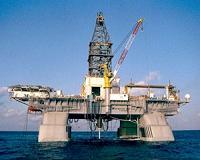 |
Baghdad (UPI) Dec 16, 2010 Iraq's Kurds are demanding greater control over their oil resources in return for supporting Prime Minister Nouri al-Maliki's new coalition government after nine months of political intrigue triggered by an inconclusive parliamentary election in March. In a previously undisclosed August-dated Kurdish communique published by the Iraq Oil Report, Kurdish Regional Government President Massoud Barzani pressed Baghdad to drop its opposition to KRG contracts with foreign oil companies, agreements the federal government deems illegal. This dispute reflects the Kurds' efforts to bolster their authority over their semi-autonomous enclave spread across three provinces in northeastern Iraq, which many dream of transforming into an independent Kurdish homeland. The Kurdistan Alliance has 57 seats in the 325-member Parliament, which makes its support vital for Maliki, the incumbent prime minister, to forge a new administration and secure himself a second term. But state control of Iraq's oil, with reserves upgraded in October from 115 billion barrels to 143.1 billion barrels, is seen as essential by Baghdad if the country is to succeed in its ambitious reconstruction program. Maliki is unlikely to surrender much to the Kurds in this regard without having to face the ire of other political and ethnic groupings that depend on oil for their prosperity. The KRG has been locked in a dispute with the federal government for four years after it started signing contracts with foreign oil companies as a planned hydrocarbons law, to regulate revenue-sharing and control of oil and gas fields, bogged down in Parliament. All told, the KRG signed 37 contracts but these have become mired in the dispute over who gets the export revenues. Some oil has been smuggled into neighboring Turkey but most has gone to Iran. Iraq Oil Report observed that, according to political insiders familiar with the negotiations, "a final agreement that would sanction the KRG contracts won't be reached until the government is fully formed and Parliament revisits legislation to govern the oil sector, which has been stalled since 2008." Another factor pitting the Kurds against Baghdad is the potentially explosive issue of who controls the Kirkuk oil fields. The Kurds claim the city of Kirkuk and its environs are historically theirs, since the formed the Kurdish governate during Ottoman rule that ended after World War I. Kirkuk contains about one-third of Iraq's oil reserves. The rest lies in the Shiite-dominated south, along with an estimated 100 billion barrels of oil in unexplored reservoirs. During Saddam Hussein's dictatorship, he drove Kurds out of Kirkuk and implanted Arabs to undermine rebellious Kurds, who fought Baathist rule for decades until Saddam was toppled in the 2003 U.S. invasion. The government has decreed that a census should be taken to determine Kirkuk's ethnic makeup and its status. But the danger of major bloodletting between Kurds and Arabs is so great that no census has been conducted and there's little expectation one will be in the near future. Maliki has battled hard to ensure federal control over the energy sector, which provides around 90 percent of Iraq's revenue. His refusal to make concessions to the Kurds on the oil issue has effectively locked up prospective exports of 150,000 barrels a day. KRG Natural Resources Minister Ashti Hawrami said Kurdish fields could produce exports of 1 million barrels a day within a few years. But the KRG's main weakness is that it's landlocked and without direct access to the pipelines running from Kirkuk to Turkey's Ceyhan terminal on the eastern Mediterranean. Maliki has until Dec. 26 to form his new government. But the complex and sensitive energy issues remain a potential roadblock. Important oil-related issues remain unresolved because of political squabbles. Until they're settled they will remain a source of conflict within the political process that will impede Iraq's efforts to rebuild. Meantime, the KRG has said it seeking to build up its own armed forces. The KRG is dominated by the Kurds' two major parties, the Kurdistan Democratic Party and the Patriotic Union of Kurdistan. Between them they control some 80,000 seasoned fighters. Whether that's the Kurds' way of pressuring Maliki over the oil issue isn't entirely clear. But the threat of the Kurds going their own way spells danger for Iraq.
Share This Article With Planet Earth
Related Links Powering The World in the 21st Century at Energy-Daily.com
 Transocean rejects responsibility in US oil disaster
Transocean rejects responsibility in US oil disasterZurich (AFP) Dec 16, 2010 Offshore drilling group Transocean, the owner of the Deepwater Horizon platform that sank off the southern US coast, on Thursday rejected any responsibility for the subsquent giant oil spill. The US government filed a lawsuit on Wednesday against BP and eight other companies, including Transocean, for uncounted billions of dollars in damages for the worst oil spill in US history in the Gulf ... read more |
|
| The content herein, unless otherwise known to be public domain, are Copyright 1995-2010 - SpaceDaily. AFP and UPI Wire Stories are copyright Agence France-Presse and United Press International. ESA Portal Reports are copyright European Space Agency. All NASA sourced material is public domain. Additional copyrights may apply in whole or part to other bona fide parties. Advertising does not imply endorsement,agreement or approval of any opinions, statements or information provided by SpaceDaily on any Web page published or hosted by SpaceDaily. Privacy Statement |